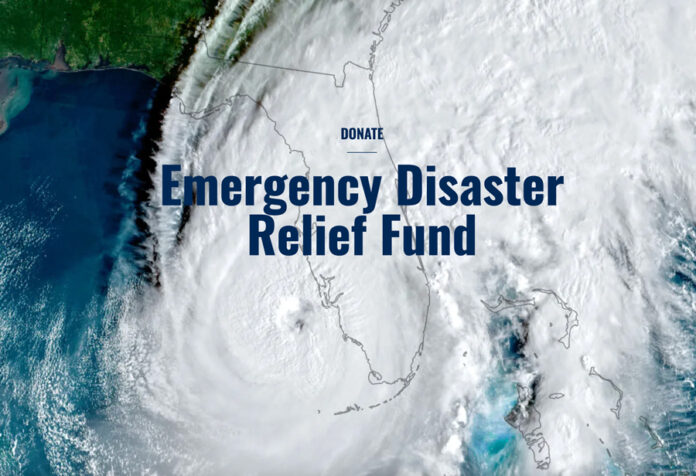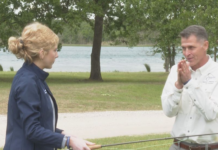Welcome to the latest installment of the Wednesday Wake-Up Call, a roundup of the most pressing conservation issues important to anglers. Working with our friends at Trout Unlimited, Backcountry Hunters & Anglers, the Theodore Roosevelt Conservation Partnership, The Everglades Foundation, Captains for Clean Water, VoteWater.org, and Conservation Hawks (among others), we’ll make sure you’ve got the information you need to understand the issues and form solid opinions.
1. Captains for Clean Water Coordinates Hurricane Relief Efforts
For many years, we’ve worked with Captains for Clean Water on Everglades Restoration advocacy and fundraising, but today, the organization is focused on helping fellow Floridians recover from the devastating effects of Hurricane Ian. CfCW is based in Fort Myers, where the storm roared ashore with a fury not seen in recent history. I texted briefly with Capt. Chris Wittman, who told me that he’s been on the water every day, running rescue and relief missions. The organization has set up a relief fund from which “100% of funds donated will go directly to providing supplies and operational support to the ongoing relief and recovery efforts, including support to the local guide community, whose businesses have been impacted tremendously.”
Click here to Donate to the CfCW Hurricane Ian Relief Fund
Related Stories:
2. Utah Cutthroat Slam Reaches 1,000 Completions

On September 12, Terrance Cook–of South Jordan, Utah–caught his fourth cutthroat subspecies, thus marking the 1,000th time an angler has completed the Utah Cutthroat Slam, marking a huge milestone for the fishing challenge that helps fund conservation efforts for native cutthroat trout in Utah. I was #37 back in 2016, the first year of the challenge, which shows how popular it has been in the six years since.
Created by the Utah Division of Wildlife Resources and Trout Unlimited, the slam is a fishing challenge that requires participants to catch Utah’s four native cutthroat trout subspecies in their native ranges. The $20 registration fee goes toward conservation projects that will benefit the native species.
“There was a time when there were few cutthroat trout populations in the state,” DWR Sportfish Coordinator Randy Oplinger said. “We have done a ton of restoration work to bring cutthroat back, and they are now a true conservation success story in Utah. The Utah Cutthroat Slam helps fund projects that continue our restoration of cutthroat trout.”

As of Sept. 19, here’s a breakdown of noteworthy statistics from the program:
- More than $80,000 has been raised for cutthroat trout restoration since the program began.
- 22 conservation projects have been completed using the proceeds generated from slam registration fees.
- 100 anglers completed the slam more than once.
- 16 is the most times one individual has completed the slam.
- Residents from 48 states have registered for the slam.
“We are thrilled to have reached this milestone and to have contributed so much to conservation efforts in Utah,” said Brett Prettyman with Utah Trout Unlimited. “But the real magic of the slam is the stories we hear from anglers about spending time with family and friends in pursuit of the fish to complete the slam. The memories they have created are helping fund the cutthroat fishing memories of the coming generations.”
Click here to learn more about the Utah Cutthroat Slam
Click here for the story of Phil’s experience doing the UCS
3. Members of Congress Introduce Bipartisan Youth Fishing Legislation
On September 22, Congressman A. Donald McEachin (VA-04) and Congresswoman Maria E. Salazar (FL-27) introduced the bipartisan Youth Coastal Fishing Program Act to create a grant program within the National Oceanic and Atmospheric Administration (NOAA) to establish youth fishing programs for urban and underserved communities. Senator Roger Wicker (R-MS) and Senator Maria Cantwell (D-WA) introduced the Senate version of the legislation.
“Too many young Americans face serious financial, social, and geographic barriers to experiencing our outdoors,” said Congressman McEachin. “No child should be unable to participate in outdoor recreation simply because of their socioeconomic status or zip code. The bipartisan Youth Coastal Fishing Program Act will provide our youth, especially those in historically underserved communities, with new opportunities to get outside, cultivate a love and appreciation for fishing, and learn more about marine science and conservation.”
“As someone who knows and recognizes the bounties of the marine and aquatic environment, I am pleased to provide younger generations of Americans across the country, especially minority Americans, the opportunity to learn firsthand about our seas, oceans and lakes, as well as provide them with the tools to enjoy them,” said Congresswoman Salazar.
The Youth Coastal Fishing Program Act would allow nonprofits, educational institutions, and other state, local, tribal, or territorial governments to pursue federal grant funding for the development and implementation of youth fishing programs. Funds could be applied for the purchase or rental of fishing equipment, transportation costs, fishing licenses, and other related expenses.
The Youth Coastal Fishing Program Act is endorsed by the American Sportfishing Association, Backcountry Hunters & Anglers, BoatU.S., Bonefish & Tarpon Trust, Center for Sportfishing Policy, Chesapeake Bay Foundation, Chesapeake Conservancy, Coastal Conservation Association, Congressional Sportsmen’s Foundation, Ebony Anglers, Guy Harvey Ocean Foundation, Hunters of Color, International Game Fish Association, Izaak Walton League of America, Marine Retailers Association of the America, National Fishing in Schools Program, National Marine Manufacturers Association, Outdoor Afro, Theodore Roosevelt Conservation Partnership, Wild Oceans, and Youth Environmental Alliance.
Click here for the full story
Credit: Source link































